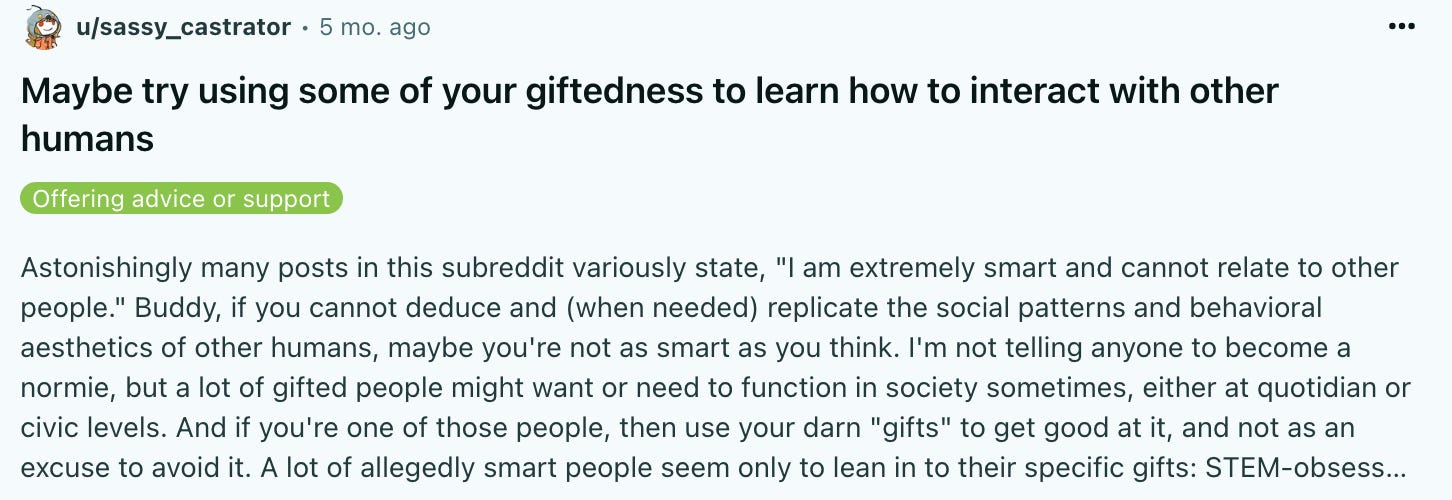if you're so smart, why are you so unhappy?
on tortured geniuses, forms of intelligence, and solving for happiness
A couple weeks ago, my roommate invited some girls over to party on the roof. They were all very pretty and studying various health sciences, and when I mentioned I taught an MCAT class, they asked what I'd scored.
“Like, my actual score?” I clarified. “The number?”
“Yeah.” So I told them.
“Holy shit.” One girl said. “You might be the smartest guy I’ve ever met.”
Actually, I'm a wreck. I'm broke, a month behind on rent, and I suck at my job. I got rejected from medical school, left it all to be an artist, then couldn't keep my band together. I sleep on top of my unfolded laundry. I wake up grinding my teeth. I am afraid of people. I am afraid of the future. I am afraid of everything.
But sure, I did well on the exam.
I'm not trying to brag, I swear. I just don’t understand — why can’t I figure it out? What am I doing wrong?
If I'm so god damn smart, why am I still so unhappy?
First, let’s dispel the myth of the tortured genius.
There’s this cultural notion that exceptional intelligence is both a gift and a curse — that heightened cognition is intrinsically bound to misery and isolation. And I’ll admit, there may be some truth to this.
If you peruse the r/Gifted subreddit (which I don’t recommend doing, ever), you’ll notice that the most common posts follow this pattern:
“I was a gifted kid, extremely high IQ, and now I’m useless, unsuccessful, and unhappy.” With a million upvotes.
Although these Reddit posts come off as self-victimizing and masturbatory, they are somewhat validated by the data: in the upper range of IQ (130+), we see a significant uptick in levels of anxiety and neuroticism.
Yet, along the rest of the IQ spectrum, intelligence is highly correlated with positive life outcomes and slightly negatively correlated with neuroticism. Smarter people are, in general, less worried and more successful.1
What this suggests: smarts and suffering are not inherently linked. You’re miserable, not due to your intelligence, but despite it.
Redditors cite the following grievances: a sense of alienation, an inability to relate to others, and self-sabotaging patterns including avoidance, procrastination and perfectionism.
Notice these are not cognitive issues, but rather, social and emotional ones — areas not typically nurtured in an academic setting.
In other words, you're not a 'tortured genius'. You're smart but emotionally incompetent.
But hey… so am I.
It’s nothing to be ashamed of. A whole generation of smart kids was taught to overvalue intellectual ability and neglect emotional and social development. Unbalanced children grew into lopsided adults, unable to cope with the demands of real life.
But that’s in the past. The future doesn’t have to be this way. We’re problem solvers, right? Let’s try and solve for happiness.
We’ll have to look beyond intelligence.
Don’t worry, we won’t abandon intelligence entirely.
We’ll just put it in its proper place.
Simon Blackburn identifies three universal components to well-being: health, happiness, and achievement.
These domains are separate but interrelated: regular exercise (health) facilitates clear thinking, which enhances performance (achievement). A strong sense of contentment (happiness) reduces chronic stress and improves mental health. But how are happiness and achievement related?
Achievement comes at a cost to happiness, you might suggest. Great accomplishments require great sacrifice. And that’s true.
But on the other hand, setting and achieving goals makes you happy.
How can both be true?
We resolve the contradiction by separating ‘happiness’ into its constituents: fulfillment (eudaimonia) and pleasure (hedonia).
Achievement requires discipline — doing the work you don’t want to do. This means, at times, deferring pleasure to accomplish goals, which contribute to fulfillment.
In practice, we don’t revoke pleasure entirely — rather, we alternate between work and rest, pain and pleasure. Cycles, like waves in the ocean. Driving endlessly towards the shore.
Still, this isn’t the full picture of happiness.
Martin Seligman is the founder of positive psychology, a practice centered on resilience and well-being. His PERMA framework breaks happiness down into 5 main components:
In his model, accomplishments (achievement) accounts for only a fraction of personal satisfaction. Other key features, including relationships and positive emotions, contribute to a holistic experience of happiness.
To be happy, he asserts, you need people. You need some pleasure. And you need purpose.
So what does this have to do with intelligence?
Up until now, we’ve only referred to cognitive intelligence (IQ), the ability to solve problems and synthesize information. IQ most directly facilitates academic accomplishment.
But to develop the other factors of the PERMA model, social intelligence (SI) and emotional intelligence (EQ) are required. These represent the skills of happiness:
Smart kids tend to rely on their IQ to try and solve social/emotional problems. This approach is somewhat effective: you can learn social scripts, develop emotional vocabulary and psychoanalyze traumas.
But as we’ve seen already, cognitive ability has its limits.
SI and EQ draw heavily on non-cognitive abilities including behavioral skills, physical memory, and trained intuition — skills that are built through experience. You learn to do by doing.
But here’s the kicker: every social skill, from charisma to humor to public speaking, can be learned. Every emotional skill, from empathy to discipline to managing negative emotions, can also be learned.
In other words, you can learn the skills of happiness — and so can I.
But how?
I’m not… entirely sure.2
I wrote the first draft of this essay after a miserable all-nighter compulsively binging video games. I ruined my sleep schedule, missed a deadline, and starved myself for 15 hours straight. I felt sicker with every game. By the end, I hated myself.
This happens all too often. Obviously the issue is emotional — but I can’t quite seem to kick it.
I’ve read every self-help book on the market. I’ve watched a hundred thousand hours of YouTube productivity advice.3 I’ve tried meditation, affirmation, gratitude and dedication — everything short of medication. And yet, nothing works.
What am I missing?
Cate Hall offers her perspective: maybe you’re not actually trying.
What you’re doing might feel like effort, she says, because you suck at it.4 But if you truly applied yourself emotionally, the same way you do cognitively, wouldn’t you achieve similar success?
Maybe she’s right — after all, I know the solutions to my problems:
I could fix my money problems by monitoring my finances, saving up, and paying my bills on time. My productivity problems, by sitting down to work every day. My social and emotional problems, by finally hiring a god damn therapist.
But I don’t do any of that. I make conscious decisions to NOT do the things that would make me happy. Which is completely backwards.
After all, intelligence is only a tool for making better decisions. You can be the smartest guy in the world, but that’s meaningless if you make all the wrong choices anyway.
I’m realizing I’m unhappy because I overvalue IQ and achievement, and undervalue EQ and the components of happiness — connections, contentment, purpose.
So I guess it’s time make a change.
One last thing — how do I know this time will be different? What will get me to actually try my hardest?
Sometimes, you find purpose in unexpected places.
It's my third week teaching MCAT classes and I'm still finding my groove. It’s a lot harder than I’d anticipated:
Starting over as a beginner has me feeling like a big fat baby. I'm fumbling, stumbling, bumbling clumsily. It's terribly humbling. I'm doing my best here! But my best is painfully mediocre.5
At first, I'd chosen the job out of convenience — decent pay and flexible prep hours.
But since I started teaching, my motivations have changed. I teach not just science content, but also the resilience and self-care skills necessary to sustain months of intense study. My students are counting on me to lead them through this challenge.
I want to do right by them. I want to lead by example. I want to be the best I can.
That means it’s finally time to address the emotional issues that have plagued my twenties. Not just for my sake, but for theirs.
Many of my students are extremely smart, hard on themselves, perfectionists. I see myself in them. When they get discouraged, here’s what I say:
Take it day by day. Don’t concern yourself with the progress of others. And give yourself a little grace. It will all come in time.
Time to start taking my own advice.
Special thanks to Ru, Eddie, Charlie and Surya for helping me figure this one out.
This likely due to the practical benefit of problem solving and resource acquisition.
(wait don’t click away)
Yes I see the irony.
(I’m paraphrasing.)
throwback for my day 1s

















A fixation on trying to “solve” yourself is part of the problem, at least in my experience. What would it mean to accept that you might be lacking skills in the EQ area, or more generally, are unhappy right now? And instead of immediately trying to change it, just sitting with it? Does it terrify you to sit with the possibility that this unhappiness may never change, that this might be who you are?
I think for people who are used to using their “intelligence” to move through life, the real change comes from moving slower and accepting, or at least not rejecting, uncertainty. And then seeing what emerges.
this is a brilliant perspective, and one that really spoke to me as someone who essentially had the "gifted kid" role forced onto him throughout my elementary and middle school years and never wanted it in the first place. really, really enjoyed this one